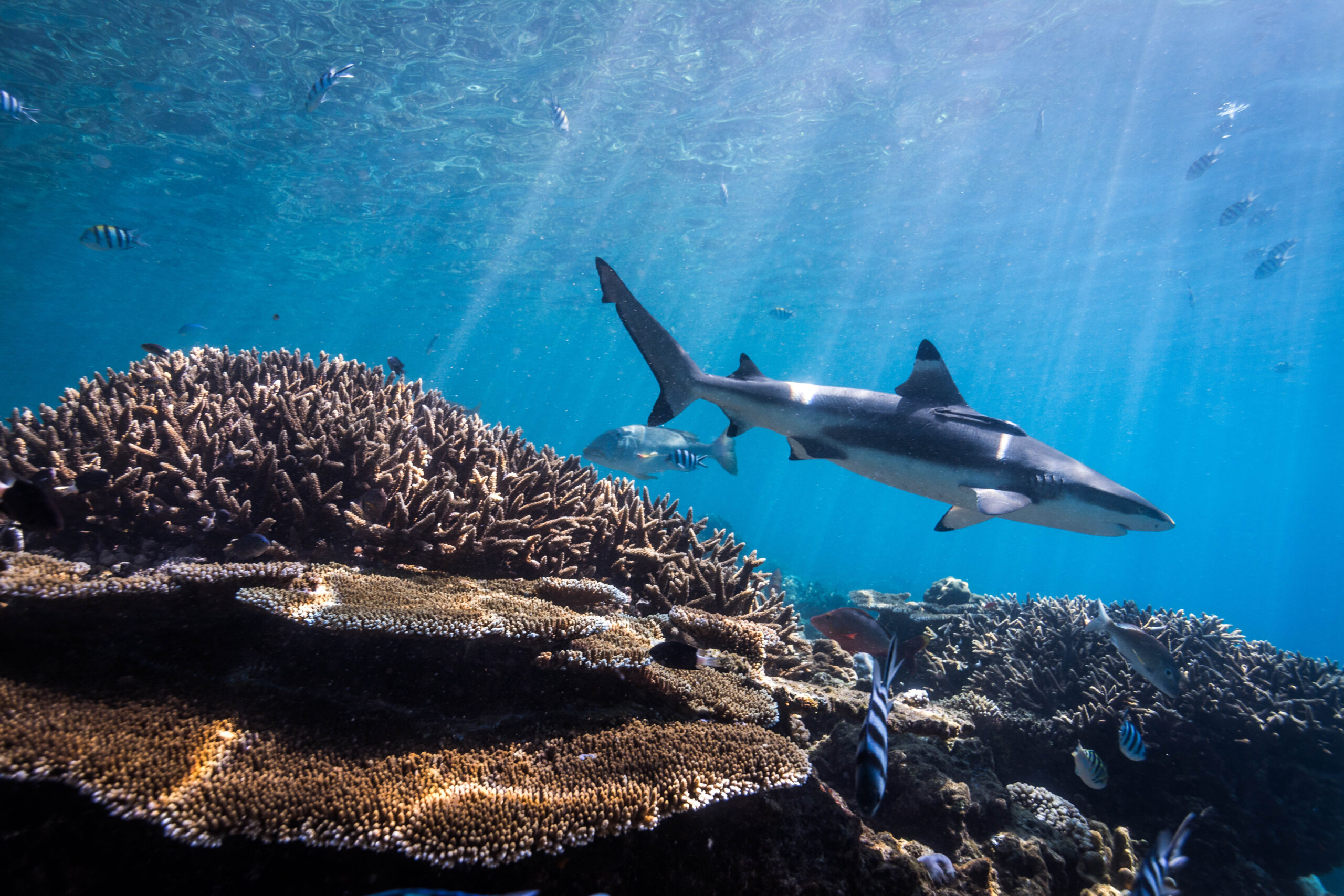Belize Lobster and Conch Fisheries: Collective Impact of Managed Access Program Puts Fisheries on Path to Recovery
Location
Port Honduras and Glover’s Reef, Belize
The challenge
Acclaimed for its beauty, biodiversity, and economic bounty, Belize’s barrier reef is the impetus behind a transformative rethinking of the country’s fisheries management system. The wild-capture fishery sector contributes significantly to the country’s economy, bringing in approximately $29 million in 2012 and employing 3,000 Belizeans, according to the Belize Fisheries Department. Prior to 2011, Belize’s fisheries operated under an entirely open-access system, whereby uncontrolled numbers of fishers with readily obtained licenses could fish as much as they want, leading to concerns about overfishing. This has resulted in an increased risk of overfishing, declining stocks, and fewer economic benefits for fishers over the long term. ref
Additionally, the COVID-19 pandemic starting in 2020 had a considerable impact on fisheries across the world. During the first year of the pandemic the Belize Fisheries Department’s annual budget was reduced by 50%, which reduced enforcement capacity. In 2020, there were no more than two fisheries department patrol vessels operating throughout the entire country (pers. Comm.).
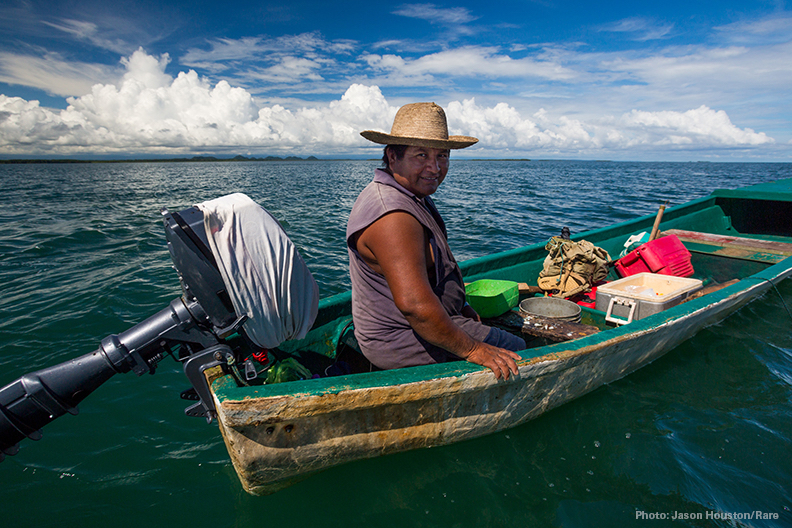
A fisherman handlines from his small panga off the coast of Punta Gorda, Belize. A full cooler of small snapper might be worth $100 for his day of work. Photo © Jason Houston/Rare
Actions taken
To address this challenge, Belize designed and implemented a coordinated Managed Access program for its fisheries, including the country’s main seafood exports, lobster and conch. After piloting the program at two sites, Port Honduras and Glover’s Reef, it was expanded to the entire territorial waters of Belize and included the creation of nine Managed Access fishing areas. Based on territorial use rights in fisheries (TURFs), the model aims to protect the health of the world’s second-largest coral reef ecosystem while ensuring the livelihoods of the fishers and fishing communities that depend on it.
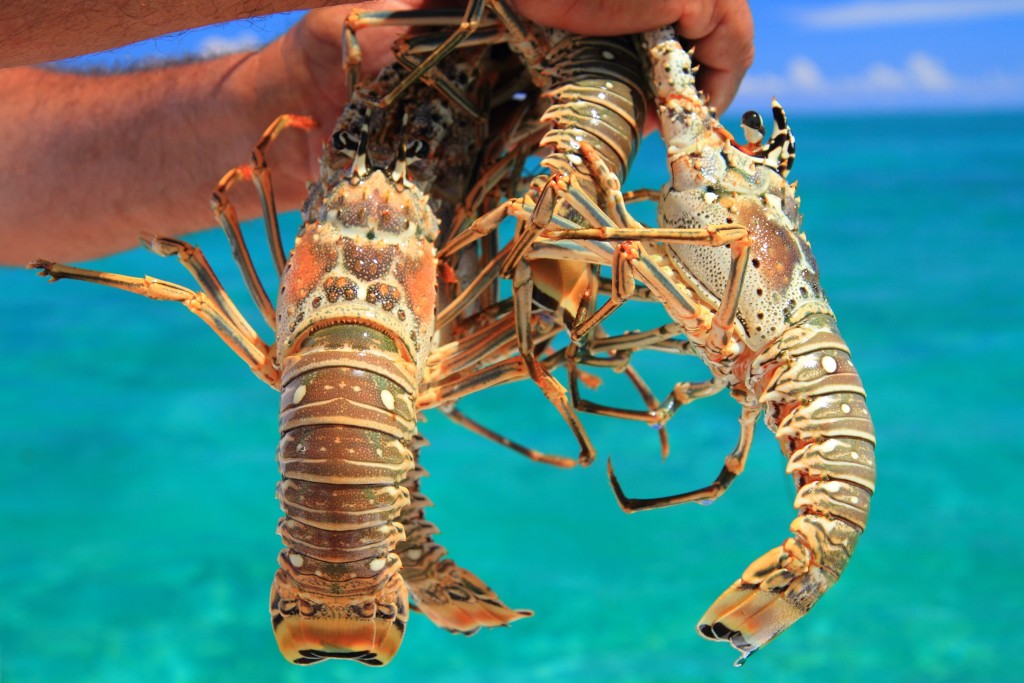
The commercial capture fishing industry for lobster and conch is an important export and a source of employment for approximately 15,000 Belizeans. Photo © Jason Houston/Rare
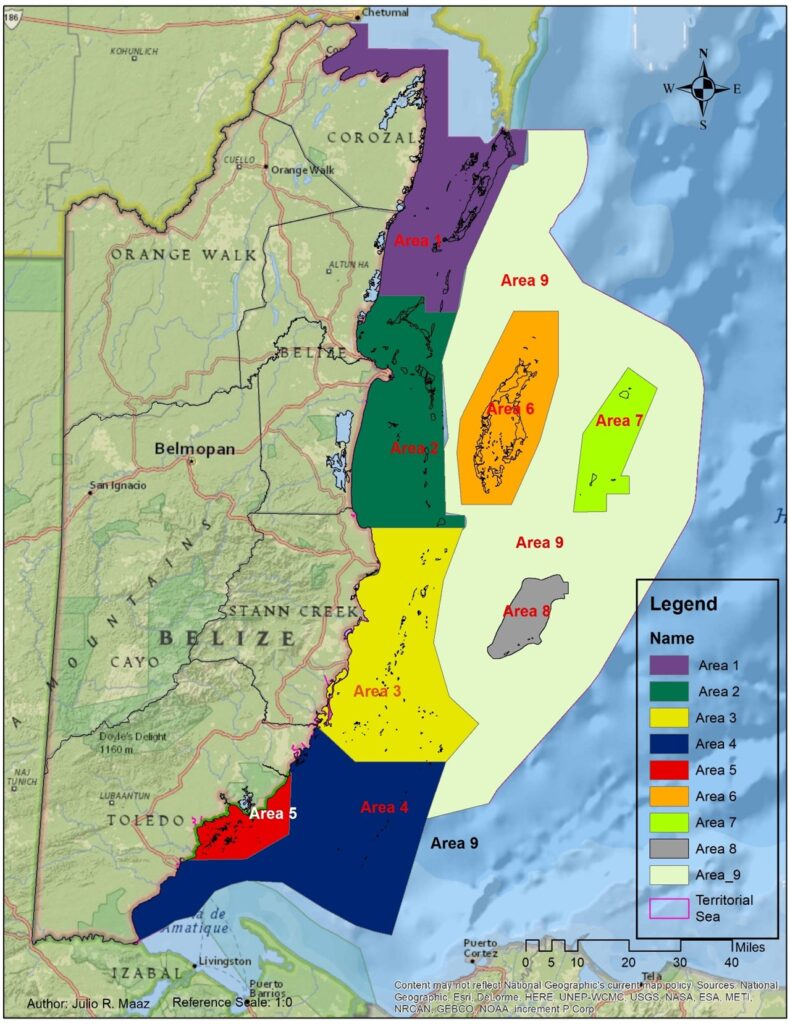
Map of the nine Managed Access fishing areas in the territorial waters of Belize. Photo © James Foley/The Nature Conservancy
Piloting policy reform: managed access
Starting in 2011, the government of Belize, the Belize Fisheries Department, and partners piloted a rights-based approach for managing fisheries at two of the country’s marine reserves: Glover’s Reef and Port Honduras. The program aims to improve the overall health and biomass of the coral reef ecosystem, reverse overfishing, and reduce illegal fishing by using harvest controls informed by fishers’ catch data and replenishment (no-take) zones to rebuild and sustain the lobster and conch populations—the two most important commercial species in the country. While fishing is prohibited in replenishment zones, licensed fishers are permitted to catch a controlled portion of fishery stocks within designated general-use zones at the two marine reserves. For conch there is an annual national harvest quota set by the Belize Fisheries Department and distributed across the two co-ops and two private companies via an annual negotiation process. For lobster, there is no quota system, so “control” refers to seasons, size limits, gear restrictions and no-take zones, as well as needing a Managed Access license that limits each fisher to one or two of the nine fishing areas.
Policy actions have included:
- Using a new area-based fishing licensing system and verification process that ended open access prior to the managed access pilot
- Collecting all catch data from fishers to monitor total production from the two pilot sites
- An adaptive management framework to assess fisheries and make management decisions based on regularly collected data
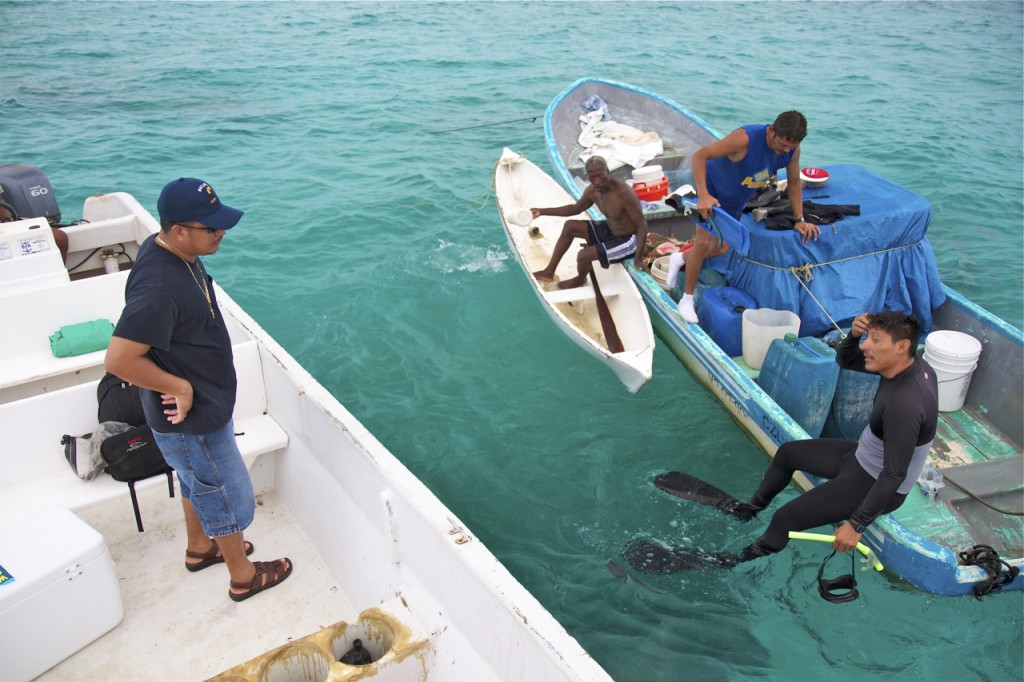
Fishermen, the government, academia, and NGOs in Belize are working together to implement a system for fishing called Managed Access, which combines territorial user-rights for fishing (TURFs) and no-take replenishment zones. Photo © Jason Houston/Rare
Pride campaign fosters sustainability, science-based management
As part of the effort, Rare trained four employees of the Belize Fisheries Department as fellows in its signature Pride campaign. The two-year program focused on leadership, communications, social marketing research, and technical assistance to foster community support for the adoption of sustainable behaviors and conservation strategies among Belize’s diverse peoples. The fellows used Langostin the Lobster to serve as the campaign’s lovable mascot, who appeared at festivals and other events, spreading key messages to generate widespread support for sustainable fisheries practices.
The fellows served as Managed Access coordinators for the pilot sites and played a key role in rapidly scaling the program nationally. They generated support for a range of fishery management methods, including credible science strategies such as protecting nursery areas and spawning populations, minimum size and weight limit regulations, closed fishing seasons, and inexpensive low-data stock assessment models for calculating catch limits and restoring fish populations.
How successful has it been?
The pilot sites, Glover’s Reef and Port Honduras, demonstrated improvements two years after implementation of Managed Access, including the following:
- The sites issued zero licenses to unqualified fishers (as determined by fishers in Community Managed Access committees responsible for making recommendations on license eligibility)
- More than 90% of fishers submitted their catch data, which helps determine stock assessments and Total Allowable Catch numbers
- Fishing violations dropped 60% compared to the open-access system
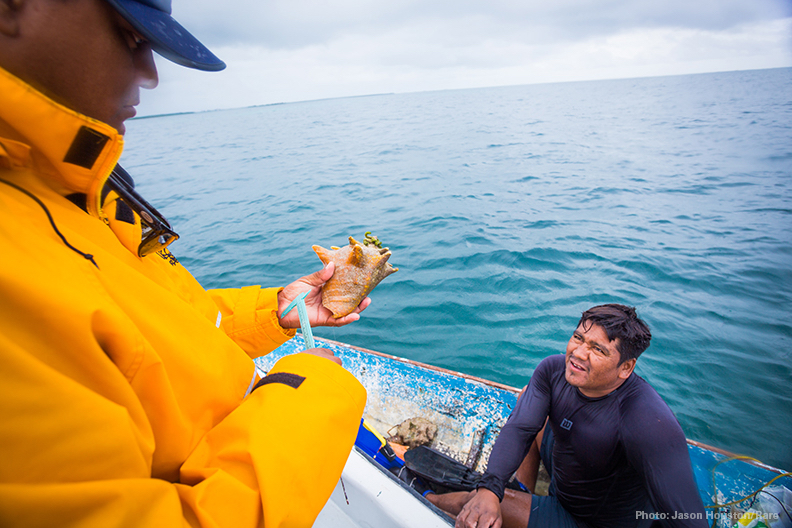
The Belize Fisheries Department conducts enforcement of lobster and conch catch. Photo © Jason Houston/Rare.
The Managed Access program has been so successful that by 2017 Belize expanded it to nine sites to foster fish stock recovery and reduce fishing pressure. The nine fishing areas cover the entire territorial waters of Belize, not just the marine reserve network. The Managed Access Working Group, which includes fishers, develops policy and builds support for and compliance with the program among Belize’s nearly 3,000 fishers. Results include the following:
- The majority of the fishing communities support Belize’s Managed Access policy
- Fishers feel they have a vested stake in the recovery of the reef and are adopting sustainable practices
- Fishers are stewards for long-term sustainability and play an active role in setting policy and carrying out enforcement
- More than 90% of fishers submitted catch data during the pilot phase
Belize’s fishery management reform model embraces a stakeholder-centered, participatory process that focuses directly on rebuilding fish populations to support and foster people’s livelihoods and marine resource stewardship. This community of innovative problem solvers is building sustainable and profitable fisheries at the right scale and pace to offer tremendous social, economic, and ecological benefits. As of 2022, Managed Access has achieved many of its goals and improved protection of fishers’ exclusive access to their traditional fishing grounds.
Lessons learned and recommendations
Economic incentives build support
Prior to the implementation of Managed Access, Belize’s open-access system allowed increasing numbers of people with readily obtained fishing licenses to harvest as much fish as possible, leading to fishers reporting dwindling catches. This resulted in concerns among both fishers and scientists of declining stocks and fewer economic benefits for fishers over the long term. Although they made a profit in the short term, fishers had to spend more time at sea to catch more fish while depleting the marine environment they depend on for income and food.
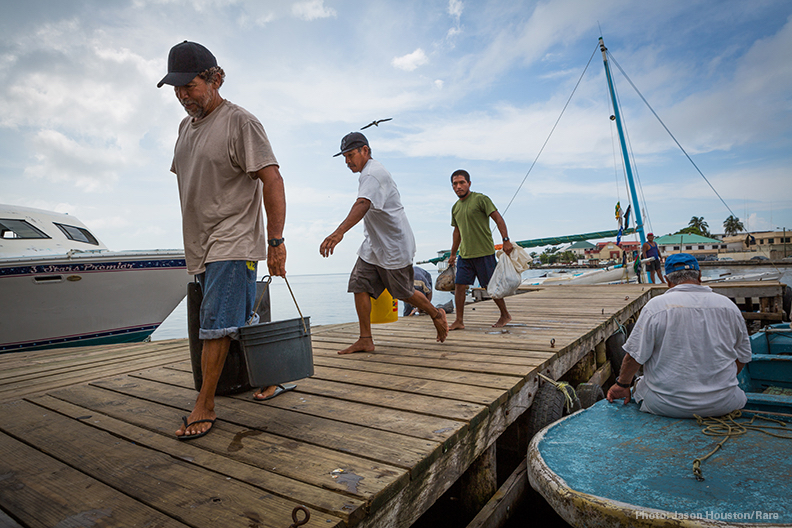
Fishermen come to sell their catch, stock up on water, ice, and gas before heading back out to the reef. The National Fishermen Producers Co-Operative Society Limited processes, packages, and ships the conch and lobster to restaurants in the United States. Photo © Jason Houston/Rare
Managed Access creates economic incentives for fishers and fishing cooperatives to become better stewards of marine resources in Belize. For example, they developed a new fishing licensing system and verification process. Fishers elected to the various local Managed Access Committees (MACs) had an opportunity to vet fishing licenses, along with other MAC representatives from government, NGOs, and local fishing associations.
After the initial pilot phase, lessons learned around fisheries data collection and management, and use of this data to inform open, accountable and transparent decision making indicated that a digital technology solution was needed to handle the quantity and improve the quality of the catch data. The Nature Conservancy (TNC) and partners responded to this need by investing in technological solutions such as Tally electronic traceability (by TNC), FisheriesApp (by TNC), TRACE (by TNC), Vessel Monitoring System (by Wildlife Conservation Society), Fish Right Eat Right (by Oceana), and the Wildlife Conservation Society (WCS)’s spatial monitoring and reporting tool (SMART) used by the Turneffe Atoll Sustainability Association for data collection within their reserve. TNC and partners are collaborating to create digital linkages between these isolated innovations to improve sea-to-plate chain of custody reporting. This serves to verify origin, capture method, handling procedures, adherence to regulations by fishers, and more to create verifiable high-quality, sustainably-caught products to build positive profiles for individual fishers ensuring their product is eligible for premium markets. This is all part of a market-driven approach to incentivize sustainable fisheries. It is possible that these innovations will eventually replace the current paper-based catch data collection and analysis system.
Community empowerment
To succeed, the Managed Access program must effectively unite the goals, efforts, and interests of fishers and fishing sector stakeholders with marine stewardship. Managed Access has empowered fishers:
- The Managed Access Working Group brings together fishers, fishing communities, government, and NGOs in a collective impact model that strives to achieve ecological, economic, and social sustainability of Belize’s fisheries sector
- Fishers participate in fisheries management decision-making, so they have a vested stake in the recovery of the reef
- Fishers collaborate in the management of the fishery and provide additional monitoring and enforcement support
- Hundreds of meetings with fishers and coastal communities have built relationships and engendered support for Managed Access
- The Belize Fisheries Department’s Pride campaign fostered community support for the adoption of sustainable behaviors and conservation strategies
Credible science
Gathering quantitative data on fishery health, catch, habitat, and so on was critical to scaling the program nationally and generating support for new fishery management methods. The Belize Fisheries Department oversees efforts such as protecting nursery areas and spawning populations, setting minimum size and weight limit regulations, closing fishing seasons, and creating inexpensive low-data stock assessment models for calculating catch limits and restoring fish populations. Credible science strategies include the following:
- Use data-informed catch limits and replenishment (no-take) zones to rebuild and sustain lobster and conch populations
- Collecting catch data and fisheries’ independent data can help determine stock assessments and total allowable catch (TAC)
- Additional tools to support digital collection on enforcement and compliance include vessel monitoring, WCS Belize and Belize Fisheries Department spatial monitoring and reporting tool (SMART), and digital landings data collection such as Oceana’s Fish Right Eat Right system and TNC’s FishPath Tool.
Market demand
New management interventions may cause potential income loss to fishers in the short term. There is also a need to generate revenue to cover operating costs of the Managed Access program and reduce reliance on philanthropic funding mechanisms. Activities include the following:
- A national plan of programs to diversify income sources from fishing and non-fishing activities.
- TNC’s seaweed mariculture program is contributing to this effort, which in turn contributes to the Government of Belize’s Blue Economy strategy set forth by the Ministry of Blue Economy and Civil Aviation.
- Initiatives by other organizations are working to align their existing and future programs to this new national agenda, since the Belize Fisheries Department (BFD) now reports to this new ministry (BFD formerly reported to the now dissolved Ministry of Agriculture, Fisheries, Forestry, Sustainable Development and Immigration).
- Fostering access to new premium markets to meet international demand for sustainable seafood.
- NGOs are aiding in the digital transformation of the fishing industry under initiatives such as the Belize Spiny Lobster Fishery Improvement Project, Fish Right Eat Right. NGOs including TNC, WCS, and Blue Ventures are providing financial support to the cooperatives to strengthen government, finance and administration procedures; improve processing efficiencies; update HACCP food safety protocols; improve membership loyalty through better benefits program; and conduct market research.
- Establishing a local seafood certification brand
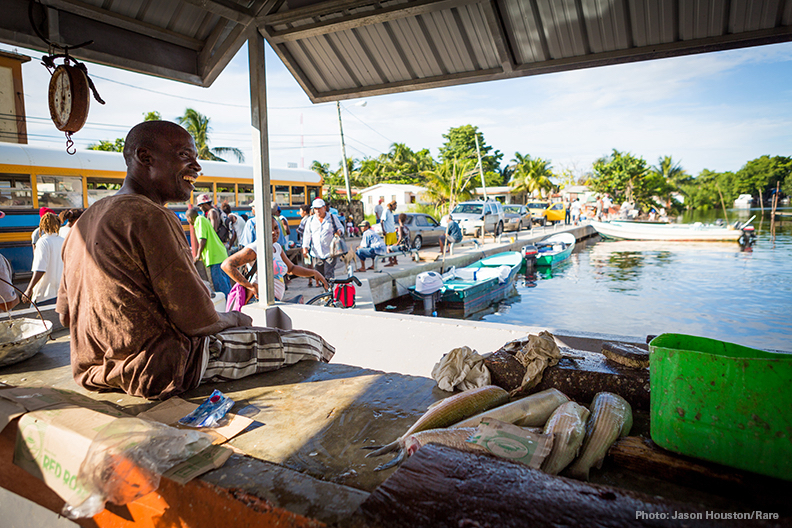
Fishermen sell their fish directly from their boats to this local market in central Belize City. Photo © Jason Houston/Rare
Funding summary
50in10 helped foster collaboration among partners and co-funded a market analysis with the Environmental Defense Fund and Rare to help Belize fishing cooperatives explore options to secure investment capital and access premium, higher-revenue export market opportunities.
Partners
Partners in the Managed Access Working Group include the Environmental Defense Fund, the Wildlife Conservation Society, The Nature Conservancy, and Rare—all active participants in 50in10—along with the government of Belize, local NGOs, fishing organizations, and fishing cooperatives.
Resources


